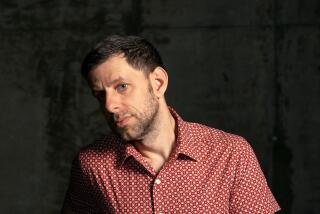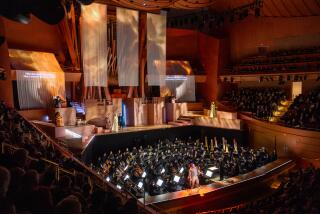TENOR CHANGED HIS TUNE, AND CAREER
SAN DIEGO — With a name like Siegfried Jerusalem, a German musician could hardly avoid Wagnerian expectations. Born into a musical family, the young Jerusalem studied piano and violin and even accompanied his uncle, noted Wagnerian tenor Herbert Becker. Yet Jerusalem embarked on his career as a bassoonist.
“My father advised me than bassoonists are very rare. He told me that if I played the bassoon, I would always have a good job. So I learned bassoon,” explained Jerusalem, 46. Over the past decade, however, he has made the transition from orchestra pit to opera stage with amazing ease.
On Saturday, he will sing the role of Erik in San Diego Opera’s new production of Wagner’s “Der Fliegende Hollaender.” This will be his West Coast operatic debut, although he has sung oratorio with the San Francisco Symphony and performed a lieder recital under the auspices of San Diego Opera last week at the Old Globe Theatre.
Since Jerusalem left his comfortable position as second bassoon in the Stuttgart Radio Symphony in 1977, he has graced the stages of the Metropolitan Opera, the Vienna State Opera, Bayreuth, Berlin Opera and London’s Covent Garden. Having sung half a dozen roles at Bayreuth, he now makes his home within commuting distance of that citadel of authentic Wagner performance.
“Our home is in the country outside of Nuremberg, a half-hour from Bayreuth. That means in the summer (during the Bayreuth Festival), I can stay at home for three months.”
Although Jerusalem is known for his Lohengrin, Walther in “Die Meistersinger,” and various roles in the Ring Cycle, the handsome and unmistakably Teutonic tenor would like to break out of this Wagnerian type-casting. “I would like to sing more Italian operas, like (Verdi’s) ‘La Forza del Destino,’ but nobody wants me. They say, ‘He’s a German heldentenor , so he should sing those German tenor roles.’ ”
He even proposed the unorthodox view that German singers may not be the best qualified to perform German opera. “I think that Swedish and Danish singers do German opera better than German singers,” he said, explaining that the softer vowels of the Scandinavian languages make a more pleasing musical sound than those of the German vernacular.
Jerusalem grew up in post-World War II Germany, but the lean times so starkly depicted by the late film maker Rainer Fassbinder nevertheless provided a fertile musical environment.
“After the war, my father had many radios, so he exchanged two radios for a piano. My sister, who is older, started piano lessons first. Then I began a half-year later. After four weeks, I was better than my sister, which made her cancel her lessons. Every day I would play ‘Figaros Hochzeit’ (Mozart’s ‘The Marriage of Figaro’) from beginning to end. I sang all the arias--tenor, soprano and bass.”
His parents’ friends were musicians, from whom the young Jerusalem received his first music lessons and with whom he enjoyed the German tradition of Hausmusik . “We had many parties at home--there was no television then--parties at home where we all played music.”
Jerusalem’s transformation from orchestral musician to opera singer was spurred by an incident in a recording studio that sounds like the plot from an old Hollywood B movie. While he was playing bassoon with the Stuttgart orchestra during a recording of Johann Strauss’ operetta “The Gypsy Baron,” the lead tenor became ill.
“Some of my friends in the orchestra knew that I sang as a hobby, so they said, ‘You have to sing this role.’ So I sang for the conductor, who gave me the role, and I learned the part in two weeks.” Jerusalem returned to the recording studio and dubbed his role over the orchestral part, in which he had performed as bassoonist the previous week. Fate and multitrack recording made him one of the few singers to solo and accompany himself on the same record.
When Jerusalem was asked why a successful Wagnerian tenor would spend time giving lieder recitals, he answered, “It’s very good for the voice--for the control of the voice. To sing Wagner, it’s best to sing lieder. Sometimes, singers forget that you have to understand the words in opera. But the public is sometimes to blame--as if a part were no more than one or two high notes sung long and loud.”
Joining Jerusalem in this Wagner production will be Vienna State Opera soprano Sabine Hass, also making her West Coast debut, and American baritone Roger Roloff, who will sing the title role of the Dutchman. Noted German director Bernd Benthaak will stage this production created by San Diego Opera’s resident designer William Gorgensen. Sung in German, this production will feature simultaneous OperaText translations projected overhead.
More to Read
The biggest entertainment stories
Get our big stories about Hollywood, film, television, music, arts, culture and more right in your inbox as soon as they publish.
You may occasionally receive promotional content from the Los Angeles Times.










